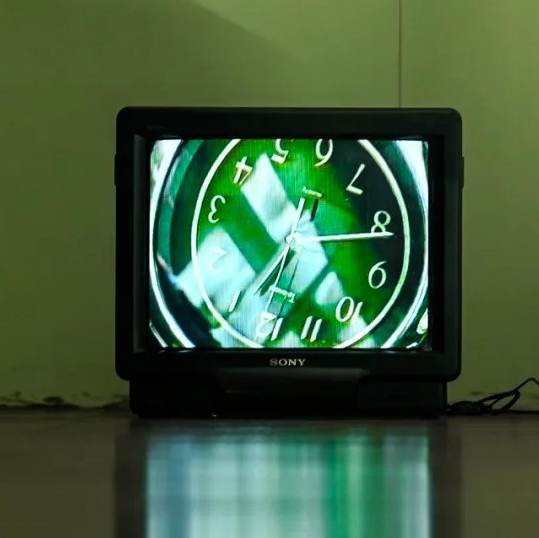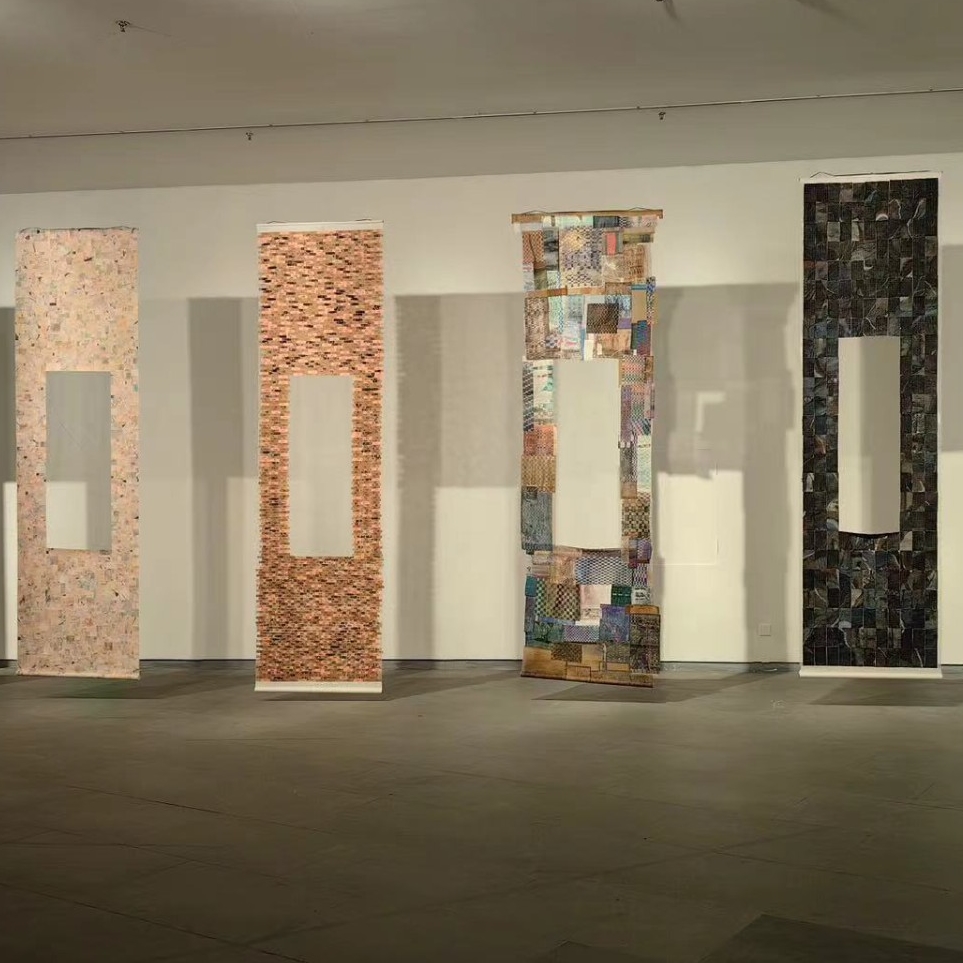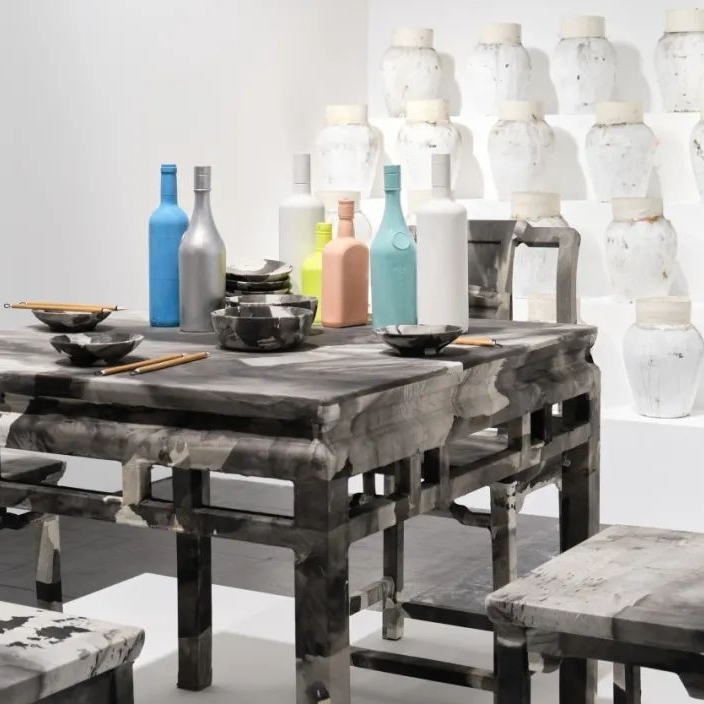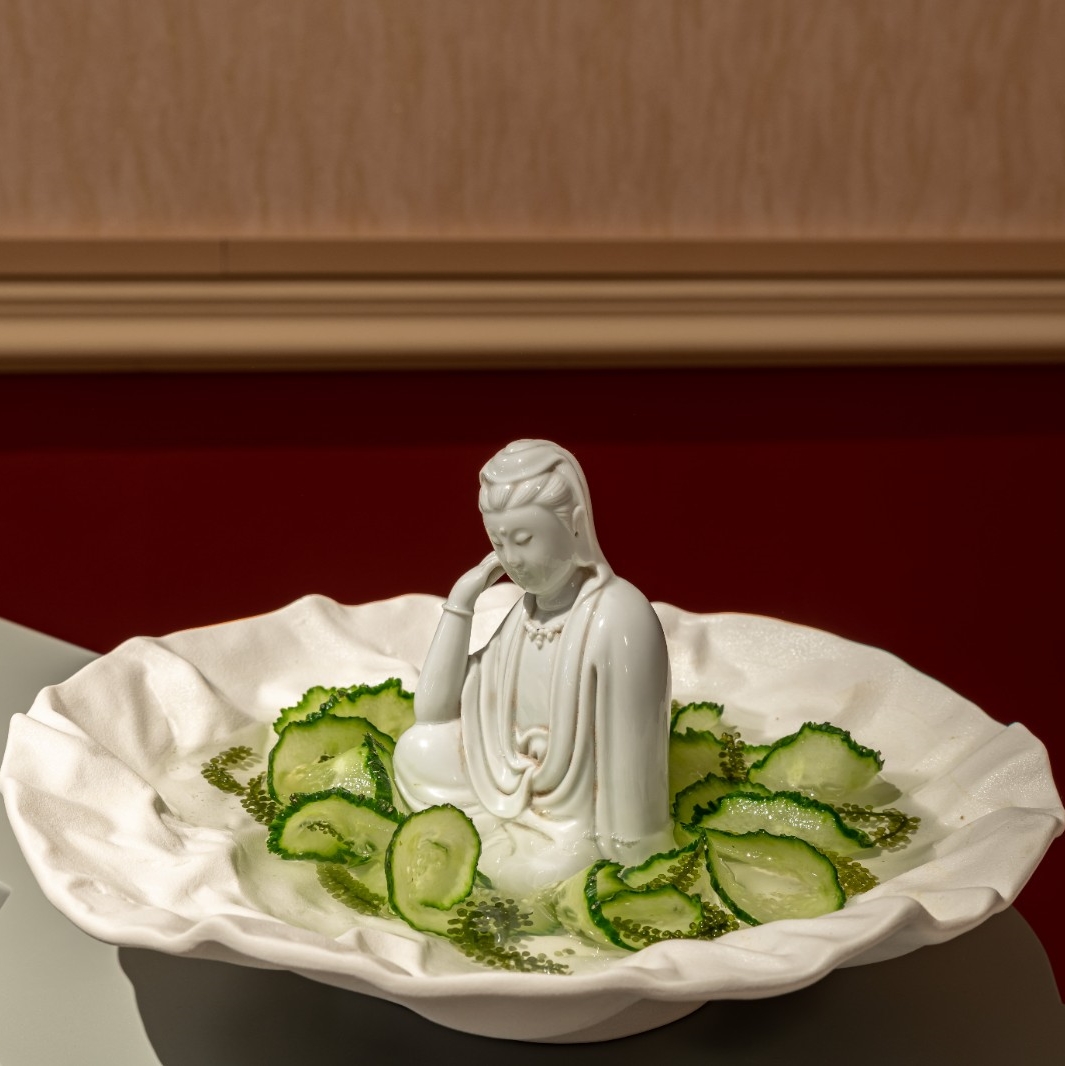 Hyperplasia No. 2 (detail), 2023; Ink, gauze, thread, 35.5×97cm
Hyperplasia No. 2 (detail), 2023; Ink, gauze, thread, 35.5×97cm
October 4, 2023, Chinese artist Zhang Yanzi’s latest exhibition themed on “The Dangerous Balance” was unveiled in Paris. Inspired by the poet Bei Dao’s review on Zhang Yanzi’s work, “The Dangerous Balance” points to the fate of an artist’s career in the first place, which requires both seeking breakthroughs and sometimes walking a tightrope. As for the six series of her works on display, namely “Breathable” (2016), “Enjoy Oneself” (2020), “The Faceless” (2023), “The Multi-face” (2023), “WE” (2023) and “Hyperplasia” (2023)—“The Dangerous Balance” is the universal footnote prescribed by the artist, “Human beings still have to live endlessly amidst continuous sorrow and trauma.” In the exhibition, we can see Zhang’s significant method of combining Chinese brushwork with medical concepts, but it further reflects her thinking that corresponds more to modern disciplines such as philosophy, psychology, and linguistics. In recent years, Zhang Yanzi has also tried to compare biology and cosmology, while adopting a divergent discussion between these two poles. Through exploring the rules of mutual mapping between the macro and micro worlds, she keeps learning and thinking and her exploration of the theme on “trauma” has become wider. It should be said that the themes of the works exhibited in “The Dangerous Balance” do not correspond to any specific events in specific venues. They seem to be more like the concentrated solution of collective destiny, as if the moment that each of us is inadvertently impressed by the artist.

 Breathable, 2016; Mineral pigments, ink and gauze, dimensions variable
Breathable, 2016; Mineral pigments, ink and gauze, dimensions variable
Recently, we seem to re-enter a time and space where disputes and conflicts are gathering. When confronted with traumatic events, we often expect immediate answers and solutions, thereby confirming moral coordinates and dividing moral camps. There is no shortage of simple ways to take a stand on social media, sometimes complex issues can be just reduced to yes or no. However, an overly simplistic stance can cause distortions in semantics. In Immanuel Kant’s view, any position that is sufficient in subjectivity but insufficient in objectivity can be regarded as a “belief.” To examine events, one needs to mobilize an open mind and look at things from a distance to avoid falling into intolerance or fanaticism. In a diverse and multi-level world, maintaining an inner distance may be a virtue. Zhang Yanzi's work, in a sense, provides an example of questioning the boundaries between right and wrong.
 Painted Skin (detail), 2020; Ink and color on cloth, 35x1200cm
Painted Skin (detail), 2020; Ink and color on cloth, 35x1200cm
For example, “The Multi-face” is completely different from her previous work “Painted Skin” (2021) in terms of creative thinking, because the artist never ceases to show the diversity of identities attached to individuals and shaped by cultures and systems, but instead Identity itself proposes reflection. The identity that exists as the external self constructs different forms in different social interactions, and then projects the subject into different social groups or categories. Zhang Yanzi first questioned a series of unreliability generated in this construction process, including the falsity and deception of identity, and the risk of fixing others in clichés through external symbols—such as skin colors. Zhang Yanzi then brings us back to the underlying logic of human beings, as she applies gauze soaked in cinnabar to represent the flesh and blood behind each different mask. These masks are not entirely masks, since the fibers of flesh and blood are faintly worn through the masks. They dissolve the absoluteness of identity diversity and return material humanity to identity.
 The Combination of The Multi-face and The Faceless, 2023; Mixed media, each about 20 x 35cm.
The Combination of The Multi-face and The Faceless, 2023; Mixed media, each about 20 x 35cm.
The Faceless, 2023; Mixed media, each about 20 x 35cm. 
The Multi-face, 2023; Mixed media, each about 20 x 35cm.
It can be said that “The Multi-face” stands firmly in terms of philosophical openness and completeness. Although Zhang Yanzi has never defined herself as an artist of art therapy, her works are often interpreted as having such a role, which is probably due to common expectations of her work. In the artist’s mind, trauma can be treated, forgotten, but it never disappears. Just like the metaphor of “Hyperplasia”, the repaired trauma is usually hidden, or left in another form of composition, and they will continue to affect our existence. Zhang Yanzi’s works are not so much “healing” as they bring “spiritual comfort.” This comfort is located at the intellectual level, which is different from the objective knowledge that pursues truth. It wraps the physical core with a metaphysical shell and re-examines the position of the pain caused by trauma in the universal order— such as nature, community, and languages, providing options for those who have not yet found comfort.

Hyperplasia No. 1, 2023; Ink, gauze, thread, 40×40cm. 
Hyperplasia No. 5 (The front and back sides), 2023, Ink, gauze, thread, 45.5×240cm.
To a certain extent, Zhang Yanzi is not open-minded at all. Since she does not easily dive into the media with which she is unfamiliar, she has no intention of becoming a trans-disciplinary artist. She admitted that only through the media that became a part of her body, such as brush and ink, can she be enabled to explore and extend her work with determination. As for other intervening materials, such as gauze, needles or other ready-made products, they do not form an independent material system. Like all artists, Zhang Yanzi is restricted by the reality of materials, but this does not mean her creation is dominated or alienated. Under the combined power of desire, taste, and ability, artists can transcend materials and bring something new. This is a beautiful example of the human pursuit of freedom. Similarly, in a sense, Zhang Yanzi is not fully modernized. Because she relies heavily on the pull of emotions and feelings, the project-based creative method of planning goals, forming plans, and finding paths is completely unworkable for her. “I have nothing but true feelings about life. As for the result of creation, this is too vague for me. I just try to get as close as possible. Expression is departure. But this departure is also the essence of creation," said Zhang.


 Details of Hyperplasia Series, 2023.
Details of Hyperplasia Series, 2023.
Zhang Yanzi has been exploring the living conditions of individuals and groups from a psychiatric perspective for many years. This unique working method has a high degree of historical connection with the place where this exhibition is held. The venue where the exhibition is located was founded by Dr. Antoinette Fouque. She majored in psychoanalysis and was tutored by Roland Barthes and Jacques Lacan in her early years, and later established the leading “Spiritual Analysis and Politics” team, a group that would later become one of the mainstays of French feminism. The academic curator of this exhibition, Elisabeth Nicoli, also comes from the field of psychoanalysis. She once served as Antoinette Fouque’s assistant and currently chairs the Editions des Femmes. The exhibition venue is connected to the women’s bookstore managed by the publishing house, and extends to the lush courtyard and the chic and quiet coffee corner. In this comprehensive third space, viewers can embark on a journey from Zhang Yanzi’s exhibition and explore the visual and theoretical aspects, and further achieve a coherent and unified awakening at all levels, whether it’s psychological or physical, thus a profound experience and cognitive journey about “trauma and facing trauma” can be realized.


 WE, 2023; Gauze, screws, mineral pigments, thread, puppets, Puppet sets with a height of about 12-16cm (dimensions variable).
WE, 2023; Gauze, screws, mineral pigments, thread, puppets, Puppet sets with a height of about 12-16cm (dimensions variable).
Zhang Yanzi has not paid frequent visits to Paris but her experience is crucial enough. In 2008, she was invited to Paris for a creative residency. During this period, she visited modern and contemporary avant-garde art and was deeply influenced by the free and surging artistic expression. She quickly liberated herself from the technical dogma of Chinese painting and began to pay more attention to the expression of her true self. At the same time, she saw ancient Chinese collections in many museums in Paris that had been difficult to see in China before, such as the extremely vivid pottery figurines from Han Dynasty in the Musée national des Arts asiatiques-Guimet. This was probably because in a foreign country, the artist’s aesthetic approach to traditional art was inspired by her utter innocence and has became more profound and meticulous. On the other hand, although Zhang Yanzi, who had just arrived in Paris, had little thought about international issues, the manifestations of social problems such as race, immigration, and poverty in France soon came into her vision. Later, she witnessed more intense political and social conflicts in New York and other places, and the superposition prompted her to reconsider the living conditions of groups under different racial civilizations. It can be said that her residency in Paris contributed to an important transformation of her creative concept, that is, looking from both inside and outside of the culture, traveling between collective consciousness and personal choice, retrospecting oneself and the world at the same time. This time, she returned to the art ecosystem in Paris with her iterative works, bringing vitality to the art city with new artistic perspectives and techniques. This process of going back and forth is not only Zhang’s own growth story, but also the process of her contribution to the “artistic portrait” of Paris. It is her perspective in the contemporary narrative of “Ecole de Paris” .


Enjoy Oneself (12 pieces in a series), 2020; Ink, mirror, iron cage, painting 26×35cm, iron cage: 35×45cm.
When the exhibition was presented, major cultural institutions in Europe were intensively preparing for the 50th anniversary of Picasso’s death. In 2008, Zhang Yanzi, who returned from Paris, proposed an alternative proposition such as “If Picasso Comes to Northern Shaanxi” in rural northern Shaanxi; now, the French female artist Sophie Calle simply covered her private memories on the work of such an art giant; and the exhibition “Surréalisme au Féminin?” that was just closed at the Musée de Montmartre in Paris in April, which brought outstanding women who had been ignored to the forefront, setting a record for the museum’s exhibition... It can be said that they jointly promoted female artists to be seen and heard, and studying how they interpret established narratives will become a clear mission for global art workers and an inevitable choice for reconstructing the context of world art history.
The opening ceremony for the exhibition was acclaimed by Parisian audiences who had followed Zhang Yanzi for many years. In 2008, they discovered the delicate and flexible Eastern brushstrokes for the first time in Zhang Yanzi’s works at the Cité Internationale des Arts in Paris; in 2023, they expressed their admiration to the artist at “The Dangerous Balance”, and they marveled at her conceptual leap as well as firmness and softness reflected in her works. Zhang Yanzi once again confessed her soft heart and serious attitude to the Paris public. Along the way, Zhang Yanzi has never abandoned her pursuit by following others. Her perspective on the world became richer, and she became more flexible and comfortable in her own language system.
About the Author:
Zhou Ying, PhD in Art History from Université Paris I - Panthéon-Sorbonne (2016-2019), served as the Pompidou Project Supervisor of the West Bund Museum (2019-2022), and she is currently studying at Institut National du Patrimoine (2023) in Paris, France.
About the Artist

Zhang Yanzi was born in 1967 in Zhenjiang, Jiangsu Province. Currently she lives and works in Beijing. Graduated from the Central Academy of Fine Arts, Zhang got her MFAs in both Chinese Painting and Literature. She works as a Professor, PhD and Postgraduate Supervisor in Central Academy of Fine Arts. Being a Chinese artist with an international reputation, Zhang Yanzi has focused on the field of ink art for more than thirty years. Over years, Zhang Yanzi has been committed to exploring the contemporary transformation of this traditional medium, thus establishing the interdisciplinary research direction of “medicine and art”, integrating traditional Chinese philosophy, traditional Chinese medicine, Western medicine and psychology along with other fields. Her artworks have also been widely recognized by society and the public. Her unique feature in creation lies in her use of the highly recognizable ink to broaden the expression boundaries of ink art, exploring the integration of various new media in ink art, since she has always centered around questioning life and existence. She has applied the unique sensitivity and talent of women to the conceptual expression of her work.
About the Exhibition
 The Dangerous Balance
The Dangerous Balance
Zhang Yanzi’s First Solo Exhibition in Paris
Organizers:
Women’s Alliance for Democracy
Gallery of Feminism founded by Antoinette Fouque
Union of Asian Artists in France
Location: Gallery of Feminism founded by Antoinette Fouque
Address: 35 rue Jacob 75006 Paris
Duration: October 5–October 28, 2023
Opening Reception: October 5, 2023, 19:00
Academic Chair: Elisabeth Nicoli
Curator: Yuhong He
Hours: Tuesday to Sunday 14:00-19:00
Infos: uaaf@outlook.com
Courtesy of the Artist.




























